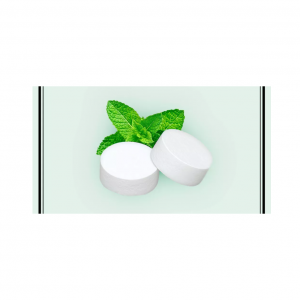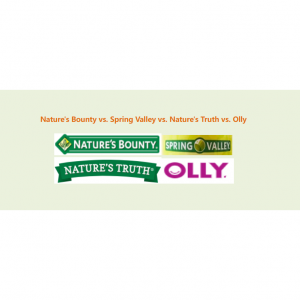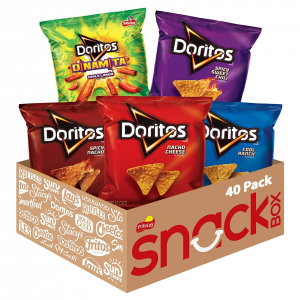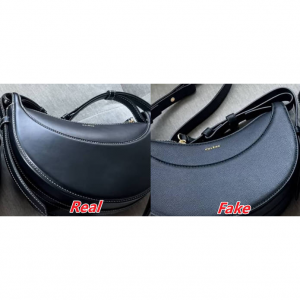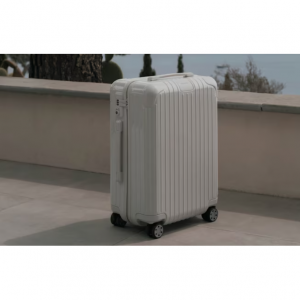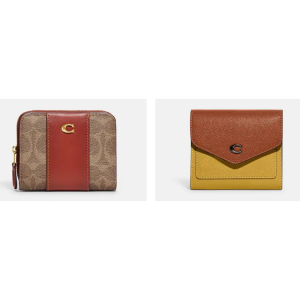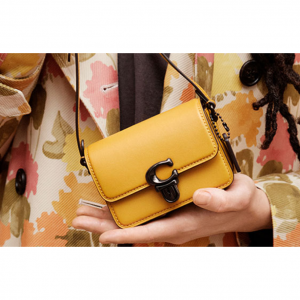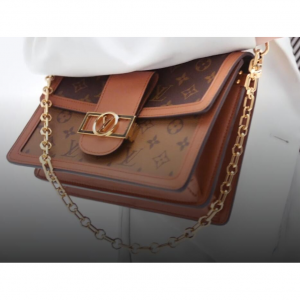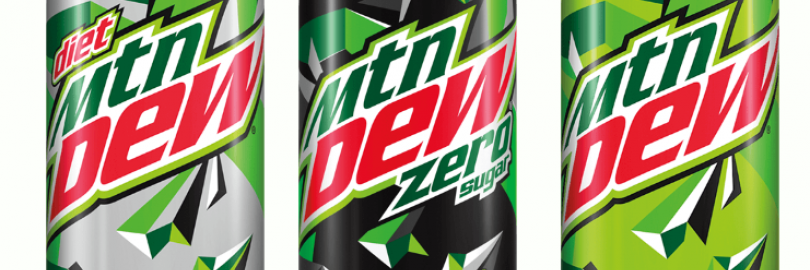
Diet Mountain Dew vs. Zero Sugar vs. Regular: Differences and Reviews 2025
If you're looking for a lower-calorie alternative to the original Mountain Dew, Mountain Dew Zero and Diet Mountain Dew are both great choices. While they have some differences in taste, ingredients, calories, and caffeine content, both drinks offer similar nutritional profiles and may be a good choice if you're watching your calorie or sugar intake.
MOUNTAIN DEW® is the No. 1 flavored carbonated soft drink in the U.S. With its one-of-a-kind citrus taste, MOUNTAIN DEW exhilarates and quenches with every sip.
In addition to the original MOUNTAIN DEW and DIET MOUNTAIN DEW®, the permanent DEW® product line includes MTN DEW® KICKSTART™, MOUNTAIN DEW® CODE RED®, MOUNTAIN DEW VOLTAGE®, MTN DEW® Zero Sugar, MTN DEW MAJOR MELON®, MTN DEW MAJOR MELON Zero Sugar, MTN DEW SPARK™ and MTN DEW SPARK Zero Sugar.
Quick View: Diet Mountain Dew vs. Mountain Dew Zero Sugar vs. Regular Mountain Dew Comparison List
DIET MTN DEW | MTN DEW ZERO SUGAR | MTN DEW ORIGINAL | |
|
|
| |
Calories | 0 | 0 | 170 |
Added Sugars | 0g | 0g | 46g |
Caffeine Content | 54 mg/12 fl oz | 68 mg / 12 fl oz | 54 mg/ 12 fl oz |
Sodium | 50mg | 40mg | 60mg |
Potassium | - | - | - |
Ingredients | CARBONATED WATER, CONCENTRATED ORANGE JUICE, CITRIC ACID, NATURAL FLAVOR, POTASSIUM BENZOATE (PRESERVES FRESHNESS), CITRUS PECTIN, ASPARTAME, POTASSIUM CITRATE, CAFFEINE, SODIUM CITRATE, ACESULFAME POTASSIUM, SUCRALOSE, GUM ARABIC, SODIUM BENZOATE (PRESERVES FRESHNESS), CALCIUM DISODIUM EDTA (TO PROTECT FLAVOR), YELLOW 5 | CARBONATED WATER, CITRIC ACID, NATURAL FLAVOR, POTASSIUM BENZOATE (PRESERVES FRESHNESS), CITRUS PECTIN, ASPARTAME, POTASSIUM CITRATE, CAFFEINE, GUM ARABIC, ACESULFAME POTASSIUM, SUCRALOSE, SODIUM CITRATE, CALCIUM DISODIUM EDTA (TO PROTECT FLAVOR), YELLOW 5 | CARBONATED WATER, HIGH FRUCTOSE CORN SYRUP, CONCENTRATED ORANGE JUICE, CITRIC ACID, NATURAL FLAVOR, SODIUM BENZOATE (PRESERVES FRESHNESS), CAFFEINE, SODIUM CITRATE, GUM ARABIC, ERYTHORBIC ACID (PRESERVES FRESHNESS), CALCIUM DISODIUM EDTA (TO PROTECT FLAVOR), YELLOW 5 |
All the great, exhilarating taste of MTN DEW® with less calories. | MTN DEW® ZERO SUGAR gives you the bold taste and exhilarating charge of your favorite original MTN DEW® but with none of the sugar. | MTN DEW® exhilarates and quenches with its one of a kind taste. |
Editor's review: Mountain Dew Zero Sugar vs. Diet Mountain Dew vs. Mountain Dew: Which is the Best Choice?
While there are many different opinions, my first choice is Diet Mountain Dew.
First, it does not contain the added sugar found in high-fructose corn syrup, which fits the low-sugar, low-carb, low-calorie diet trend. Zero sugar intake helps reduce some health risks, such as weight gain, frequent acne, and increased blood pressure.
Second, Diet Mountain Dew has a light citrus flavor but isn’t too sweet. Mountain Dew is a little too sweet for me. Since it's designed to mimic the original flavor, of course Zero Sugar is also sweet, but slightly milder than the original flavor. Diet Mountain Dew has a rounder flavor and Zero Sugar has a slightly more tart flavor.
Third, Diet Mountain Dew has a relatively low caffeine content. Even if you drink four cans a day, you will not suffer from headaches, insomnia, rapid heartbeat, nervousness and other problems. Mountain Dew Zero Sugar has the most caffeine. Mountain Dew Zero Sugar contains 68 mg of caffeine in a 12 fl oz can. Energy drink lovers may like this.
Fourth, Diet Mountain Dew contains real orange juice in its ingredient list. Although I can't explain anything, I feel that its quality is better.
For more details and differences on Mountain Dew products, continue browsing below.
Money Saving Tips First:
In fact, you can save up to 100% on online shopping at home and abroad!
Such a high amount of cash back comes from Extrabux (What is Extrabux?), it also offers coupon codes and recent promotions, and brings together 10,000+ sites (US, China, UK, Japan, Australia , Germany, France, Italy, etc.).
Just sign up for an Extrabux account and earn exciting cash back every time you place an order via the relevant link. Sign-Up Bonus: Join for FREE & Earn $20 Welcome Bonus today! Then earn $5 Friend Referral Bonus!
Whether you are buying cheap domestic products, international luxury goods, or buying mobile phones, computers, refrigerators, washing machines, clothes, shoes, bags, mother and baby products, snacks, drinks, or booking air tickets, hotels, car rentals, or registering services and memberships , you can save money on all related purchases - save $1,000 a year!
MORE FROM
The Origin of Mountain Dew
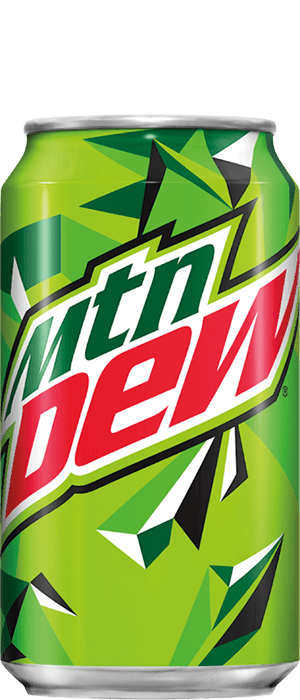
Mountain Dew, known as Mtn Dew in some countries, is a carbonated soft drink brand produced and owned by PepsiCo.
The original recipe was created in 1940 by Tennessee beverage bottlers Barney and Ally Hartman.
Its competitors include Coca-Cola Co.'s Mello Yello and Keurig Dr Pepper's Sun Drop, but Mountain Dew ranks No. 1 in U.S. citrus soft drink sales.
The Origin of Diet Mountain Dew
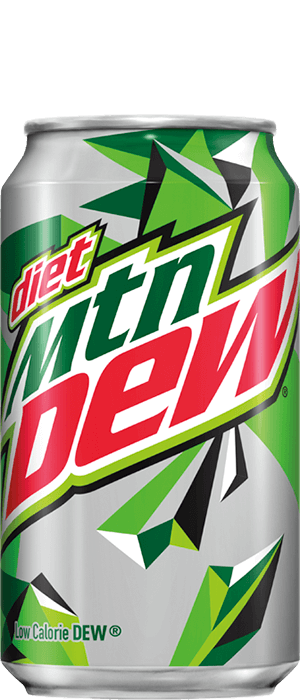
Diet Mountain Dew was first launched in 1984 as Sugar-Free Mountain Dew and was later renamed Diet Mountain Dew.
Diet Mountain Dew is a variation of Mountain Dew that has only 4 calories compared to the original's 170 calories and is sweetened with artificial sweeteners instead of high fructose corn syrup.
The Origin of Mountain Dew Zero Sugar
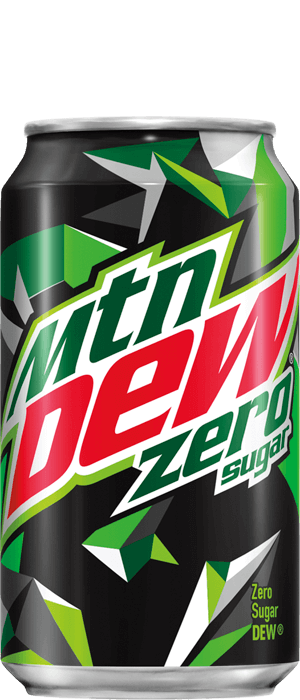
Mountain Dew Zero Sugar was first leaked on the Dew Drinker Discord on September 11, 2019, planning to get released in some sizes.
Months after being leaked, it was officially released in stores nationwide as a permanent flavor on January 13, 2020, in various sizes such as 20-ounce Sidekick bottles, 24-ounce bottles, and 16-ounce/16.9-ounce multi-pack bottles , 1 liter bottles, 2 liter bottles, 12-packs, 24-packs.
In the first half of 2025, Mountain Dew Zero Sugar was launched in Taco Bell restaurants, replacing Diet Mountain Dew's spot on fountain machines.
Diet Mountain Dew and Mountain Dew Zero Sugar vs. Regular Mountain Dew: What are the main differences?
>> Low calorie, no calorie, no sugar
Both drinks, Diet Mountain Dew and Mountain Dew Zero Sugar, are sugar-free alternatives to regular Mountain Dew.
Unlike regular Mountain Dew, which contains added sugar, the sugar-free version of Mountain Dew uses artificial sweeteners to sweeten it, since drinking too much added sugar can cause people to consume too many calories, which can lead to weight gain.
In addition, a high-sugar diet may lead to health problems such as obesity, fatty liver disease, high blood pressure, acne, type 2 diabetes, and heart disease.
Try Mtn Dew Zero Sugar or Diet Mtn Dew today!
Diet Mountain Dew vs. Mountain Dew Zero Sugar: What are the main differences?
Here’s a comparison of the key differences between Diet Mountain Dew and Mountain Dew Zero Sugar:
>> Diet Mountain Dew vs. Mountain Dew Zero Sugar: Sweeteners
Diet Mountain Dew and Mountain Dew Zero Sugar use almost the same artificial sweeteners. They both contain three sweeteners; they both use aspartame, acesulfame potassium, and sucralose for sweetening.
A 12-ounce can of Mountain Dew contains 46 grams of sugar. This is at the top end of soda's sugar content. The U.S. Food and Drug Administration (FDA) considers all three sweeteners safe.
Aspartame is a low-calorie sweetener that delivers the sweet taste you love without increasing your calorie intake.
Acesulfame potassium is a non-caloric sweetener used in foods and beverages to provide sweetness. Acesulfame potassium can also be added to other sweeteners, such as aspartame, to prolong sweetness and help reduce bitterness and aftertaste.
Sucralose is a no-calorie sweetener that can be used to lower one’s intake of added sugars while still providing satisfaction from enjoying the taste of something sweet.
>> Diet Mountain Dew vs Mountain Dew Zero Sugar: Ingredients
While the difference in sweeteners isn't dramatic, Diet Mountain Dew and Mountain Dew Zero Sugar do have slightly different ingredient lists.
Diet Mtn Dew contains orange juice concentrate, while Mtn Dew Zero Sugar does not contain orange juice concentrate.
Since orange juice is very high in calories, I guess Mtn Dew Zero Sugar removed orange juice because it wanted to provide a truly zero sugar and zero calorie drink.
>> Diet Mountain Dew vs. Mountain Dew Zero Sugar: Taste
Mountain Dew Zero Sugar is designed to more closely mimic the taste of regular Mountain Dew. Mountain Dew is one of the sweetest carbonated drinks in the world, so of course, Mountain Dew Zero Sugar isn't any less sweet.
Since both Diet Mtn Dew and Mtn Dew Zero Sugar are sweetened with aspartame, they both leave an aftertaste that is not as natural as original Mtn Dew. While Mountain Dew Zero Sugar is just as sweet as regular Mountain Dew, it doesn't have as long of a sweet aftertaste.
The drinks are the same color, but Zero Sugar takes on a slightly sharper citrus flavor. Zero Sugar is more lemony and Diet is more limey.
In terms of carbonation, Diet Mountain Dew has the highest level of carbonation, followed by Mountain Dew, while Mountain Dew Zero Sugar has the lowest level of carbonation. The result is that Mountain Dew Zero Sugar is smoother and easier to swallow because it doesn't cause a stinging sensation on the throat.
>> Diet Mountain Dew vs. Mountain Dew Zero Sugar: Calorie Content
Diet Mountain Dew is low in calories, making it an excellent choice for those looking for a soda that won't add calories.
Calorie and sugar-conscious consumers may have noticed some weirdness with the calorie counts for various sizes of Diet Mountain Dew. A 12-ounce can will have 0 calories, but larger serving sizes will have 5, or even 10 calories. This is because the FDA requires companies to round to the nearest 5 calories, with anything below 5 calories per serving able to be stated as 0.
Mountain Dew Zero Sugar is zero calories, making it the perfect choice for those who strictly monitor their calorie intake or follow a calorie-restricted diet.
>> Diet Mountain Dew vs. Mountain Dew Zero Sugar: Caffeine Content
Another difference between these two drinks is their caffeine content.
A 12-ounce can of Diet Mountain Dew contains 54 mg of caffeine, while Mountain Dew Zero Sugar contains 68 mg of caffeine. By comparison, a can of regular Mountain Dew contains 54 milligrams of caffeine.
So why does Mountain Dew Zero Sugar contain more caffeine than other versions of Mountain Dew?
Caffeine is used to enhance the flavor of the drink and is said to add a hint of bitterness to balance out other elements.
So Mountain Dew Zero Sugar will taste richer and sweeter, while Diet Mountain Dew will taste less sweet.
With its high caffeine level, Mtn Dew has the advantage of straddling the soda and the energy drink market. This may appeal to those looking for drinks that provide functional benefits.
Frequently Asked Questions
Is Diet Mountain Dew or Mountain Dew Zero Sugar healthier?
Diet Mountain Dew and Zero Sugar Mountain Dew are both lower-calorie options than regular Mountain Dew. However, they still contain artificial sweeteners and food coloring, so they may not be considered "healthy" drinks.
However, they may be a good choice if you want to reduce your calorie or sugar intake. Just be sure to drink them in moderation as part of an overall healthy diet.
How many calories are in Diet Mountain Dew and Mountain Dew Zero Sugar?
A 20-ounce bottle of Diet Mountain Dew contains less than 10 calories, while a 20-ounce bottle of Mountain Dew Zero contains 0 calories.
Which drink has more caffeine, Diet Mountain Dew or Mountain Dew Zero?
Mountain Dew Zero has slightly more caffeine than Diet Mountain Dew. A 12-ounce bottle of Mountain Dew Zero contains 68 milligrams of caffeine, while a 12-ounce bottle of Diet Mountain Dew contains 54 milligrams of caffeine.
| Top 10 Most Carbonated Soda in the World 2025 |
| Top 10 Most Sugary Sodas in the World, Ranked 2025 |
| The 10 Top Lemon-Lime Flavored Drinks, From Soda to Sparkling Water |
| Top 10 Most Caffeinated Sodas in the World 2025 |
| Ginger Ales Shoutout: Canada Dry vs. Schweppes vs. Seagram's vs. Vernors? |
| Canada Dry Ginger Ale Zero Sugar vs. Regular: Differences and Reviews 2023 |
| Diet Mountain Dew vs. Zero Sugar vs. Regular: Differences and Reviews 2025 |
| Diet Dr Pepper vs. Dr Pepper Zero vs. Regular vs. Cream Soda: Differences and Reviews 2025 |
| Pepsi Zero vs. Diet Pepsi vs. Pepsi Max vs. Pepsi One: Differences and Reviews 2025 |
Diet Coke vs. Coca-Cola Zero Sugar vs. Regular Coca-Cola: Differences and Reviews 2025 |
| Everyday Dose vs. RYZE vs. MUD WTR: Which Brand is Best for Mushroom Coffee? |
| Truvani vs. Ka'Chava vs. RYZE vs. Isagenix: Which Brand is Best for Superfood Meal? |
| Ninja CREAMi vs. Deluxe vs. Breeze: Differences and Reviews 2025 |
| Top 10 Strongest Mints in the World 2025 |
| 10 Healthy Nutella Alternatives That Are Low-Calorie and Vegan-Friendly |
| Top 10 Longest Lasting Chewing Gum in the World 2025 |
| 5 Better or Cheaper Alternatives to Liquid I.V. (No Sugar or Less Sugar) |
| 13 Mintiest Toothpastes in the World, Ranked 2025 |
| BioSteel vs. Gatorade vs. Liquid I.V vs. LMNT: Who is Best for Electrolyte Drink? |
| Top 10 Mintiest Gum in the World 2025 |
| Electrolit vs. Gatorade vs. Powerade vs. Pedialyte: Who Wins the Sports Drink Brand Showdown? |
| Chips Ahoy vs. Oreo vs. Famous Amos vs. Chips More: Who Makes the NO. 1 Cookies Brand? |
| Liquid I.V. vs. Gatorade vs. Pedialyte: Which Makes the Best Electrolyte Drink? |
| OLIPOP vs. Poppi vs. Culture Pop vs. Zevia: Which Brand is Best for Prebiotic Soda? |
| 10 Most Popular Soda Brands in the World, Ranked 2025 |

Extrabux is an international cashback shopping site, offering up to 30% cashback from 10,000+ Stores!
Squarespace, SkinStore, MATCHESFASHION, The Wall Street Journal, NordVPN, Visible, Armani Exchange, Sam's Club, PUMA, AliExpress, Card Cash, NET-A-PORTER, Udacity, Udemy, Selfridges, LOOKFANTASTIC, Vimeo, Coach Outlet, lululemon, PrettyLittleThing, Booking.com, Ripley's Aquarium, iHerb, Groupon, etc.
Join to get $20 welcome bonus now! (How does Welcome Bonus work?)
Recommendation
-

Is Turkish Airlines Good for International Flights?
-

10 Best & Stylish Winter Coats for Women on NET-A-PORTER in 2025
-

Top & Best 12 Sneaker Apps/Websites for Raffles, Releases & Restocks in 2025
-
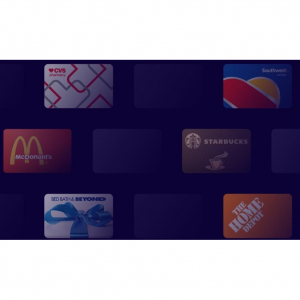
7 Best Gift Card Exchange Sites - Buy, Sell and Trade Discount Gift Card Safely and Instanly!
-

Top 9 Professional Skincare Brands for Licensed Estheticians 2025

